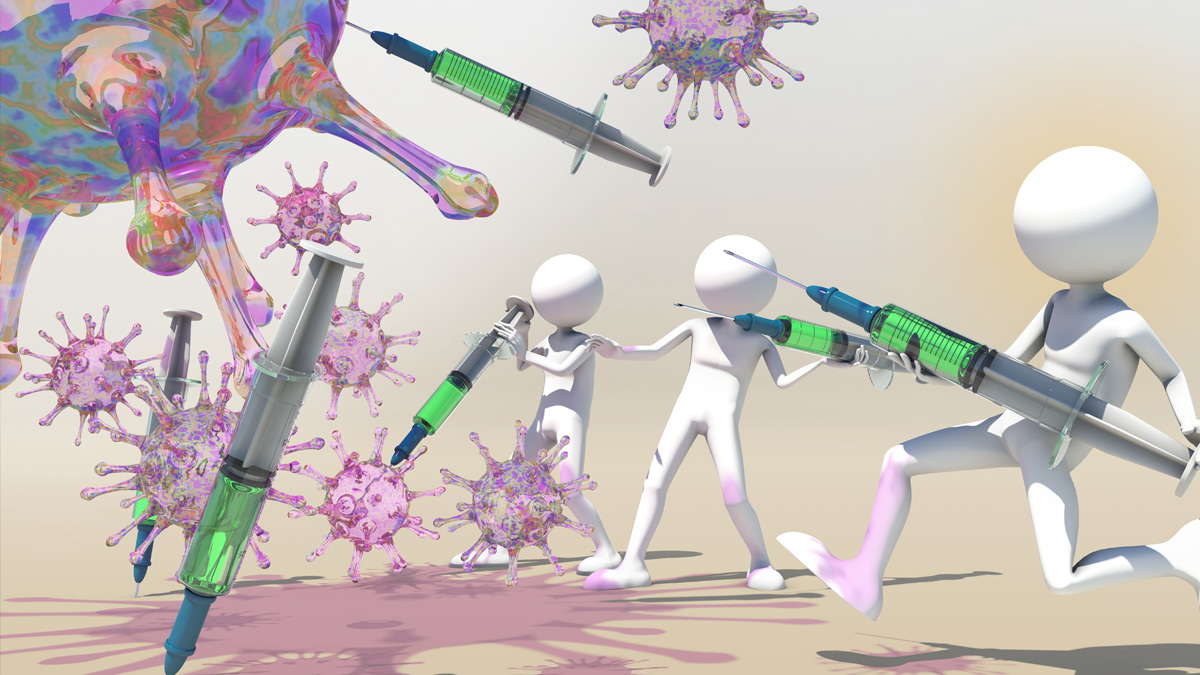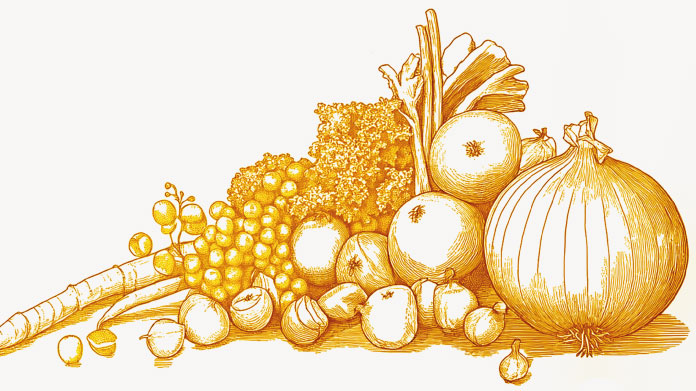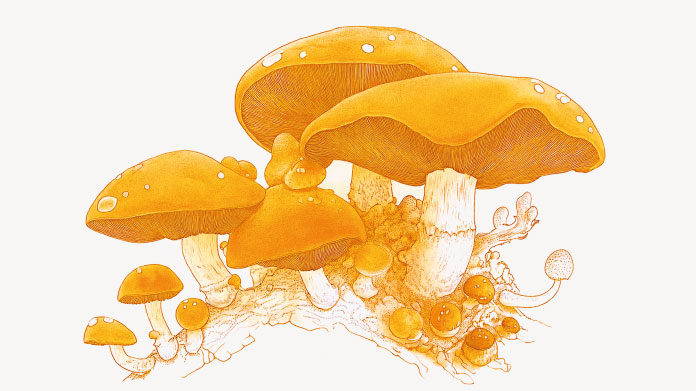8 secrets of the immune system
Here we explore the mysteries of our immune system and what we need to do to boost our immune defenses.

As winter never fails to remind us, the immune system is our first line of defense against external aggressors: viruses, bacteria and various pathogens... Though we know broadly what the immune system does, it still has secrets to reveal!
The body has two types of immunity
Innate immunity is the kind that provides an immediate response – it’s ever-ready and waiting to combat external aggressors as soon as they appear and in whatever form! The skin and mucosa are the body’s first shields against attacks, and then it’s the turn of the inflammatory system, which clears the way for specialized white cells called phagocytes to ingest and destroy pathogens.
Acquired immunity, also known as adaptive or specific immunity, comes into play following an infection: the body learns to recognize the antigens attacking it and develops a specific response. The primary players here are other white cells called lymphocytes which produce antibodies specially created to destroy the pathogens in question. With acquired immunity, the body is thus able to develop an immune memory: this is the mechanism which, for example, stops us repeatedly catching chicken pox or glandular fever.
Immunity and the gut are closely linked
It’s true! Awareness of this connection is starting to grow, so much so that the gut is now often referred to as ‘the second brain’. The fact is, we ingest a number of pathogens along with our food. While the hostile environment of the stomach destroys some of them, it’s in the gut that this action is greatest, since this is where the bulk of nutrients from food are transferred into the bloodstream. The intestines therefore contain a great many immune cells which both absorb harmful elements before they’re able to colonise the body, and then eliminate them from the body by natural means (1).
To maintain an effective immune system, it’s thus important to look after your gut flora, especially by boosting the activity of naturally-present bacteria because they modulate and strengthen immune activity. For a probiotic-rich diet, choose fermented foods, such as yogurts, cheese, sauerkraut or fermented soya, or take probiotics.
Chronic stress is a threat to the immune system
When faced with a stressful situation, the body reacts by releasing hormones, primarily adrenalin and cortisol. These speed up the heart rate and provide the body with sufficient energy to cope. But when stress drags on or recurs too frequently, these hormonal responses become over-intense: cortisol, in particular, can end up making immune cells ‘resistant’, reducing their effectiveness against pathogens. Stress also over-stimulates white cells, exacerbating inflammation which has a damaging effect on the body (2). So, to ensure good immunity, take the time to relax! There are various relaxation techniques you can try that should help to a large extent.
Taking exercise promotes healthy immune defenses
The evidence is clear: regular exercise protects the immune system, particularly at the level of the thymus. This small gland at the base of the brain produces T lymphocytes, essential to the immune response, but it declines with age. Being physically active helps maintain good thymus activity throughout life. And as exercise also helps lower stress levels, it delivers all-round benefits! Take care, however, not to exercise too intensively as this can have the opposite effect: it’s not about exhausting yourself, but achieving the right balance for healthy immunity, which is regular, moderate exercise (3).
Adaptogen plants are valuable allies of the immune system
These multi-benefit plants have remarkable effects on immune activity. Ginseng stimulates all types of immune cells - macrophages, lymphocytes... (4). Ashwagandha also has an immune-stimulant action, increasing the number of white cells available to combat external aggressors (5). Rhodiola, eleutherococcus and maca are all effective at stimulating the immune defenses (6,7,8). These plants are also exceptionally rich in antioxidant and anti-inflammatory molecules, and are a potent weapon – both preventively and therapeutically – against viral and bacterial infections. Virtually all of them can be found in the product Adaptix, an exceptional adaptogen supplement that should be seriously considered by anyone with weakened immunity.
Exhausted? Well, your immune system probably is too!
When we sleep, the body recharges all the physiological batteries it needs in order to function properly, including the immune defenses. When we get too little sleep, or that sleep isn’t sufficiently restorative, there’s a decrease in both the number and efficacy of our immune cells (9). To make sure you sleep soundly, and for long enough, you should avoid all stimulants (tea, coffee, alcohol, energy drinks) and screen time before bed. Sophrology and relaxation exercises can help if you suffer from insomnia and find it hard to clear your mind before going to sleep. Valerian or melatonin supplements can also promote drowsiness – indeed, there’s a huge range of options to choose from to help you get a good night’s sleep!
Diet plays a crucial role in immunity
It’s often said that diet is the first remedy. And that’s also the case here: poor nutrition leads to serious dysfunction of our natural defenses, allowing pathogens to enter the body more easily. Balanced meals with a variety of foods should provide all the nutrients needed for good immune function. In addition to probiotic-rich foods for safeguarding your gut flora, those high in vitamins and minerals will stimulate immune system function effectively. So eat plenty of fruits and vegetables rich in vitamins and minerals, as well as oily fish containing ‘good’ fats, vitamin D and zinc, and dried fruits with magnesium... Be sure to consider taking a multivitamin complex if you feel you need to: a course of Daily 3 will definitely revitalise your immune system. The formulation was updated in 2019 to deliver an unprecedented level of excellence: 42 exceptional ingredients (including 12 vitamins and 8 minerals) in natural forms optimal for the body.
For stronger immunity... laugh!
Research has demonstrated that laughter boosts the immune defenses (10). Laughing reduces levels of the stress hormone, cortisol, and increases the number and efficacy of immunoglobulins (antibodies circulating in the body) and lymphocytes. Laughter is a remedy to be taken every day, as often as possible!
The immune system is complex and involves numerous elements. Try to live a healthy, good-humoured life, and follow our health tips if you want to maintain excellent immunity and minimise the impact of winter ailments on your everyday life!
References
- John B. Furness, Wolfgang A. A. Kunze, and Nadine Clerc. The intestine as a sensory organ: neural, endocrine, and immune responses. American Journal of Physiology-Gastrointestinal and Liver Physiology 1999 277:5, G922-G928.
- David N Khansari, Anthony J Murgo, Robert E Faith, Effects of stress on the immune system, Immunology Today, Volume 11, 1990, Pages 170-175.
- Duggal, NA, Pollock, RD, Lazarus, NR, Harridge, S, Lord, JM. Major features of immunesenescence, including reduced thymic output, are ameliorated by high levels of physical activity in adulthood. Aging Cell. 2018; 17:e12750.
- Kang S, Min H. Ginseng, the 'Immunity Boost': The Effects of Panax ginseng on Immune System. J Ginseng Res. 2012;36(4):354–368.
- Mohammed Ziauddin, Neeta Phansalkar, Pralhad Patki, Sham Diwanay, Bhushan Patwardhan, Studies on the immunomodulatory effects of Ashwagandha, Journal of Ethnopharmacology, Volume 50, Issue 2, 1996, Pages 69-76.
- Jung-Yeal Kim, Young-Jong Lee, A Study on the Effects of Rhodiola rosea Root on the Immune System, Kor. J. Herbology 2008;23(4):179-189.
- Gerhard G. Steinmann, Anke Esperester, Peter Joller, Immunopharmacological in vitro Effects of Eleutherococcus senticosus Extracts. Arzneimittelforschung 2001; 51(1): 76-83
- Wei Wang, Ye Zou, Qian Li, Riwen Mao, Xingjun Shao, Dun Jin, Daheng Zheng, Ting Zhao, Huifen Zhu, Lin Zhang, Liuqing Yang, Xiangyang Wu, Immunomodulatory effects of a polysaccharide purified from Lepidium meyenii Walp. on macrophages, Process Biochemistry, Volume 51, Issue 4, 2016, Pages 542-553.
- Lange, T. , Dimitrov, S. and Born, J. (2010), Effects of sleep and circadian rhythm on the human immune system. Annals of the New York Academy of Sciences, 1193: 48-59.
- Dillon, K. M., Minchoff, B., & Baker, K. H. (1986). Positive Emotional States and Enhancement of the Immune System. The International Journal of Psychiatry in Medicine, 15(1), 13–18.
Keywords
2 Days
great products and prices
great products and prices
Marie
7 Days
Easy to navigate site
Easy to navigate site, had what I was searching for, good price. easy order-check out
James Tucker
14 Days
My skin is clearing up nicely!
Pretty good for my skin so far.
Christian
16 Days
The new packaging is excellent
The new packaging is excellent - finally! No more squashed boxes and torn envelopes.
GORAN
17 Days
Great Product
Great Product
Larry Garrett
21 Days
Quick shipping
Quick shipping; good price. No issues!
Mary McCarty
22 Days
Thr product is very good and is helping…
Thr product is very good and is helping me on my health. Then is always on time
LUGO Luz
25 Days
Buying was fine
Buying was fine. I had problems with the website not recognizing my login info, and had to call to get it fixed. Other than that, everything was good.
David S. Clark
25 Days
Your super maca and super ginseng are…phenomenal
Your super maca and super ginseng are phenomenal supplements that compliment each other when taking them together. Fantastic feeling of well-being and lots of mid day energy without the crash.
Keith Mason
28 Days
I have had amazing results with every…
I have had amazing results with every supplement I've purchased. I am extremely satisfied with this company
kirstin Torres
28 Days
Fine products
Fine products . They are on the leading edge of online supplements. The only issue -so far-is they sometime run out of subscription items.
Jason Argos
31 Days
The ordering process is very user…
The ordering process is very user friendly and the products always come in a timely manner.
CARTER Rhonda
32 Days
The price for Dr
The price for Dr. Pero's AC-11 is reasonable and in line with his views. (my former colleague). Keep it pure.
CAMPBELL Clayton
35 Days
Right on every time.
Right on every time.
Arthur Nicholas
37 Days
They are cheaper than everyone else and…
They are cheaper than everyone else and the shipping was fast. Great company.
Patricia Adams




